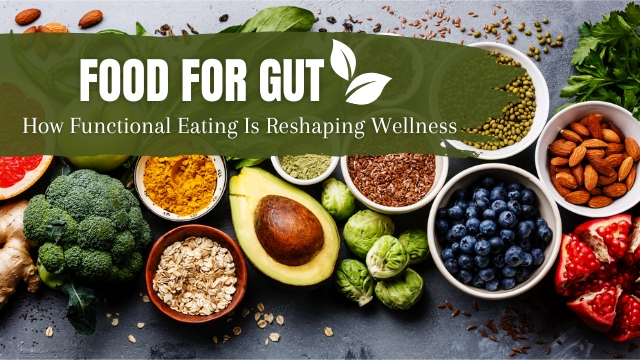From turmeric lattes to probiotic smoothies, our plates—and palates—are undergoing a transformation. No longer just about satisfying hunger or counting calories, food is now being viewed through the lens of function. At the heart of this shift is the growing focus on gut health, which is fast becoming a cornerstone of holistic well-being.
Driven by a blend of ancient Indian wisdom and modern nutritional science, functional foods—those that offer health benefits beyond basic nutrition—are becoming essential additions to daily diets. Whether it’s a spoonful of ghee, a serving of fermented rice, or a refreshing glass of kombucha, these mindful choices are redefining what healthy eating looks like.
Why Gut Health Is the New Wellness Frontier
For decades, the gut was understood primarily as a digestive organ. But emerging science has revealed its much broader influence on overall health. The gut hosts trillions of microorganisms, collectively known as the gut microbiome, which play a critical role in immunity, metabolism, hormonal balance, and even mental health.
When this microbial ecosystem is disrupted—by poor diet, stress, antibiotics, or environmental toxins—it can lead to a range of issues: bloating, low energy, skin conditions, mood swings, and more. A balanced gut, on the other hand, supports nutrient absorption, lowers inflammation, and improves resilience to illness.
That’s why improving gut health through food is no longer considered an optional wellness trend—it’s a practical lifestyle shift.
Understanding Functional Foods
Functional foods are natural or minimally processed ingredients that do more than just feed us—they heal us. They are rich in probiotics, prebiotics, fibre, antioxidants, or anti-inflammatory compounds that actively contribute to better health.
In India, many traditional foods already fit the bill. Curd, buttermilk, fermented rice batter (used in idlis and dosas), and homemade pickles are naturally probiotic. Spices like turmeric, ginger, and asafoetida aid digestion and reduce inflammation. Grains like millets and lentils, long staples of the Indian diet, offer essential prebiotic fibre that feeds healthy gut bacteria.
The movement isn’t limited to traditional ingredients. Modern additions like kombucha, kefir, chia seeds, flaxseeds, and gluten-free ancient grains are gaining popularity for their gut-friendly benefits and versatility in recipes.
Tradition Meets Innovation
What’s remarkable is how seamlessly traditional Indian dietary practices align with modern gut-health strategies. Ayurveda, India’s ancient system of medicine, has long recognised the importance of agni—the digestive fire—as the foundation of health. Daily habits such as starting the day with warm water, including ghee in meals, or consuming digestive herbs are all rooted in nurturing the gut.
Today, these principles are being reinterpreted for modern lifestyles. Wellness brands and startups are packaging ancient ingredients in new-age formats: turmeric shots, herbal infusions, probiotic teas, and functional snack bars. Fermented condiments, gut-friendly smoothies, and curated wellness boxes are making functional eating more accessible and appealing.
Even restaurant menus are evolving, featuring gluten-free grains, fermented foods, and beverages designed to support gut health.
A Growing Shift in Eating Habits
The movement toward functional eating is also about changing how people view food. It encourages a more mindful approach—choosing meals not just for taste or convenience, but for how they support physical and mental well-being.
In everyday life, this could mean starting the day with soaked chia seeds, adding turmeric to a morning drink, or eating a bowl of curd after lunch. These small habits, when practiced consistently, help maintain a healthy gut ecosystem and prevent long-term health issues.
It also signals a shift in consumer behaviour—from reactive to proactive health. Instead of waiting for digestive or immunity problems to appear, people are using functional foods as daily tools for prevention and self-care.
The Future of Functional Food in India
As awareness grows, the functional food landscape in India is expected to expand significantly. Urban wellness cafes, boutique brands, and Ayurvedic nutritionists are shaping a new food culture—one where gut health is not an afterthought, but a priority.
Even food tech is getting involved, with personalised nutrition plans and microbiome-based testing slowly gaining traction. As people begin to understand how deeply their food choices affect their energy, mood, skin, and immunity, the demand for functional foods is only set to increase.
Functional eating is not about restriction or fad diets—it’s about inclusion. It’s about adding foods that support long-term health, integrating timeless traditions with evidence-based practices.
Gut health is not a niche interest—it’s the foundation of wellness. And with the right foods, it’s possible to nourish your body, balance your emotions, and boost your energy naturally.
As functional foods continue to take centre stage, they remind us that what we eat doesn’t just fuel us—it shapes us. The journey to better health, it turns out, begins right on our plate.





